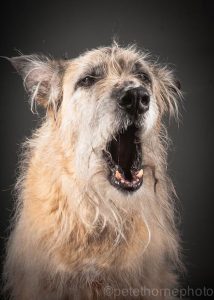
Analysis by Dr. Karen Shaw Becker
If you have a senior dog in the family, you may be wondering if her diet needs adjusting now that she’s getting up in years. This is actually a very good question, and in fact, recent research suggests that dogs’ bodies experience significant changes as they age.1 The study evaluated 80 large-breed dogs from adulthood through old age or death and measured levels of certain chemicals in their blood. The following changes were observed to occur as they got older:
- 51% increase in DNA damage, specifically, increased 8-Hydroxydeoxyguanosine (80HDG) levels; 80HDG is a specific marker of oxidative damage to DNA
- 86% decrease in heat shock proteins (HSP70), which measure the ability of the body to repair cellular damage
- 30% increase in C-reactive protein (CRP), which rises in response to inflammation
These results illustrate that just like humans, dogs’ bodies undergo damaging physiological changes as they grow older. That’s why it’s tremendously beneficial to add appropriate “antiaging” high-quality supplements to an older dog’s diet (more about this shortly).
I also almost always recommend digestive enzymes and probiotics for older pets. For dogs who need additional fiber, I suggest supplementing meals with natural sources of fiber such as psyllium husk powder, ground dark green leafy vegetables, coconut fiber or canned 100% pumpkin.
I also typically recommend an omega-3 fatty acid supplement such as krill oil, another fish body oil (except cod liver oil) or algal DHA for pets who are allergic to seafood.
The diet most older dogs thrive on
Contrary to what many pet parents have been told and many veterinarians still believe, aging pets need more protein than their younger counterparts, and the quality is vitally important. The more digestible and assimilable the protein is, and the higher the moisture content of the food, the easier it will be for aging organs to process.
Feed a nutritionally balanced, species-appropriate, fresh food diet rich in healthy fats, including omega-3 fatty acids such as krill oil. The perfect fuel for an aging dog is a variety of living, whole foods suitable for a carnivore.
Eliminate all refined carbohydrates, which are just unnecessary sugar. No grains, potatoes or legumes, which foster inflammation in the body. Replace those unnecessary carbs with extra high-quality protein. Eliminate extruded diets (kibble) to avoid the toxic byproducts of the manufacturing process.
Highly processed pet feed (most pet food isn’t made from human-grade ingredients and is therefore, by definition, animal feed) does not nourish aging bodies in a way that slows degeneration.
It’s also important to note that AAFCO (Association of American Feed Control Officials) hasn’t established nutrient profiles for senior or geriatric pets. This means processed pet feed diets with added supplements marketed for older dogs are formulated without guidance from AAFCO.
Most pet foods are manufactured in a way that creates byproducts that can affect cognitive health, including heterocyclic amines and acrylamides, in addition to advanced glycation end products (AGEs). Fresh, biologically appropriate foods provide the whole food nutrients and amino acids the aging brain requires.
The right diet will also enhance your dog’s microbiome, which has been linked to improved cognitive health in humans, and I’ve seen improvements in pets as well.








